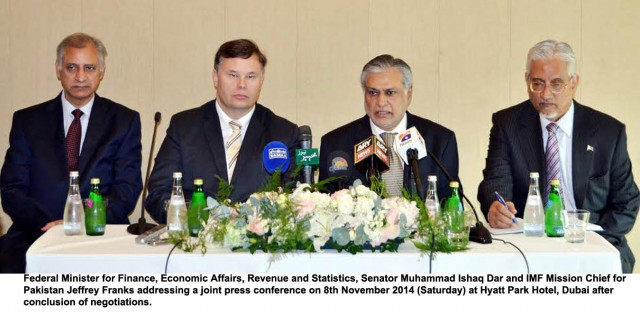Dubai round: Talks with IMF successful even as reforms hit snag
Despite poor show, lender up for approving $1.1 billion loan in December

Despite the country’s relatively poor show in core areas of the $6.6-billion Extended Fund Facility, the International Monetary Fund (IMF) and Pakistan were able to conclude the Dubai round of their talks successfully, paving the way for the release of $1.1 billion in December.
IMF’s mission chief to Pakistan Jeffery Franks and Finance Minister Ishaq Dar announced on Saturday the successful culmination of their talks, which began on October 29, over a review of the country’s economic performance in April-June – for the fourth review – and July-September – for the fifth review – periods.
“Upon Board approval, about $1.1 billion will be made available to Pakistan in December,” according to IMF’s official statement.
The reviews concluded following the government’s decision to increase electricity prices by over 25% through equalisation surcharges. Talks for the fourth review had ended inconclusively in August after the government delayed the increase in power tariffs, fearing public backlash.
In order to fulfill its commitments, the government first charged inflated electricity bills by withdrawing slabs before increasing the tariff by Rs2.02 per unit through two separate equalisation surcharges, according to officials of the Ministry of Water and Power.
However, in order to declare the Dubai event successful, the IMF staff had to agree to give three waivers in critical areas of building foreign currency reserves, reducing government borrowings and net domestic assets, according to a handout issued by the IMF from Dubai. The lender of the last resort also showed its displeasure over the government’s inability to bring reforms in taxation and energy.
“The performance criteria were missed on the target on Net Domestic Assets of the SBP for end-June and end-September periods and on government borrowing from the central bank for end-June and end-September periods, as well as Net National Reserves for end-September period,” according to the IMF’s handout.
Building foreign currency reserves is the most critical pillar of the three-year programme. However, the IMF has so far given two waivers on this account and the third wavier would be given by the Executive Board of the IMF when it meets next month to approve the $1.1 billion.
‘Nothing but a political decision’
Meanwhile, Dr Ashfaque Hasan Khan, a renowned economist and member of the government’s Economic Advisory Council, termed the successful conclusion a political decision.
“Despite failure to perform on the key pillars of the programme, the successful conclusion of fourth and fifth reviews is nothing but a political decision,” said Dr Khan.
Sources in diplomatic circles said that the United States Treasury Department also played its “productive role”.
The rapid build-up of gross reserves, which rose from $5.4 billion at the end of March to $9.1 billion by the end of June 2014, stalled thereafter due to delays in divestment and Sukuk transactions in addition to the effects of political uncertainty on capital flows, said the IMF. It added that going forward reserves are expected to surpass the amount needed for three-month imports by the end of the current fiscal year. The three-month import bill requirements are around the $13-billion mark, while at present gross official reserves stand at $8.6 billion. The IMF does not include commercial banks reserves in its calculations.
The IMF said that authorities are committed to taking the necessary corrective actions for missed targets, and with these actions, they will be on track to meet their objectives for end-December.
The IMF staff also urged Pakistan to deepen its structural reform agenda in order to improve the country’s competitiveness in global markets. “High priority needs to be placed on enhancing governance and efficiency of energy firms, and in strengthening the capacity of regulatory bodies,” said the IMF.
However, according to energy experts, the government’s sole focus has so far been on increasing electricity tariffs or charges, as it was not ready to take the difficult task of improving governance and efficiency in power generation and distribution companies.
The IMF said that progress was being made in broadening the tax base by eliminating concessions and exemptions granted through Statutory Regulatory Orders. “However, continued efforts are needed to improve the tax-to-GDP ratio and create resources to finance much-needed spending on investment and social development, while making the taxation system more efficient, transparent and equitable,” it added.
Published in The Express Tribune, November 9th, 2014.
Like Business on Facebook, follow @TribuneBiz on Twitter to stay informed and join in the conversation.



1733130350-0/Untitled-design-(76)1733130350-0-208x130.webp)















COMMENTS
Comments are moderated and generally will be posted if they are on-topic and not abusive.
For more information, please see our Comments FAQ